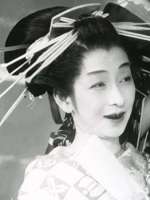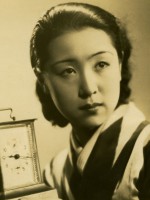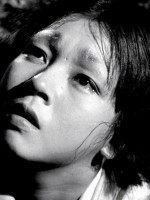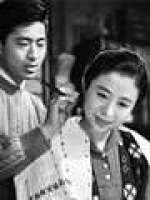Trois générations de Danjurō is a japonais film of genre Drama directed by Kenji Mizoguchi with Toshiko Iizuka
Trois générations de Danjurō (1944)
Danjurō sandai

If you like this film, let us know!
- Infos
- Casting
- Technical infos
- Photos
- Videos
- Film quotes
- Characters
- Music
- Awards
Trois générations de Danjurō (団十郎三代, Danjurō sandai) est un film japonais réalisé par Kenji Mizoguchi, sorti en 1944.
Synopsis
Le petit-fils d'une famille d'acteurs réintègre sa famille en devenant à son tour acteur de kabuki.Actors
Comments
Leave comment :
Suggestions of similar film to Trois générations de Danjurō
There are 91 films with the same actors, 36 films with the same director, 61828 with the same cinematographic genres, to have finally 70 suggestions of similar films.If you liked Trois générations de Danjurō, you will probably like those similar films :

Utamaro and His Five Women (1946)
, 1h35Directed by Kenji Mizoguchi
Origin Japon
Genres Drama
Themes Seafaring films, Peinture, Sports films, Transport films, Martial arts films
Actors Kinuyo Tanaka, Bandō Mitsugorō VIII, Hiroko Kawasaki, Toshiko Iizuka
Rating69%





The story is set in Edo (now Tōkyō) in Japan. The film starts with a parade of samurai and their concubines (oiran, distinguished by their high shoes) along an avenue of cherry trees. Koide, called Seinosuke by his woman (Kotaro Bando), an artist/samurai apprenticed to a Kanō master, leaves the parade and visits a print shop where he sees a woodcut print by Utamaro that boasts of ukiyo-e 's superiority to the official style. Enraged, he goes to a tea-house to find Tsutaya Jūzaburō, the owner of the print shop, to express his displeasure. Word is leaked to Utamaro to avoid the tea-shop, but instead he goes there directly to investigate. Koide then challenges him to a duel. Utamaro counter-challenges him with a different kind of duel––a painting contest.

Ugetsu (1953)
, 1h37Directed by Kenji Mizoguchi
Origin Japon
Genres Drama, Science fiction, Thriller, Comedy, Fantasy, Horror, Historical
Themes Seafaring films, Sports films, Transport films, Martial arts films, Ghost films
Actors Masayuki Mori, Machiko Kyō, Kinuyo Tanaka, Mitsuko Mito, Eitarō Ozawa, Ryosuke Kagawa
Rating80%





Ugetsu is set in villages which line the shore of Lake Biwa in Ōmi Province in the late 16th century. It revolves around two peasant couples – Genjurō and Miyagi, Tōbei and Ohama – who are uprooted as Shibata Katsuie's army sweeps through their farming village, Nakanogō. Genjurō, a potter, takes his wares to nearby Ōmizo. He is accompanied by Tōbei, who dreams of becoming a samurai. A respected sage tells Miyagi to warn her husband about seeking profit in time of upheaval, and to prepare for a probable attack on the village. Genjurō arrives with his profits, but she asks him to stop. Genjurō nevertheless works long hours to finish his pottery. That night Nakanogō is attacked by soldiers, and the four main characters hide out in the woods.
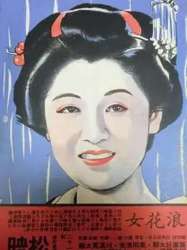
Osaka Woman (1940)
, 2h25Directed by Kenji Mizoguchi
Origin Japon
Genres Drama
Actors Kinuyo Tanaka, Yōko Umemura
Rating70%





Quand Ochika, issue d'une famille riche, épouse Danpei, un pauvre joueur de shamisen, elle se consacre complètement à lui et prend en main ses affaires, au point de semer des dissensions au sein de la troupe de jōruri dans laquelle joue son mari.

Victory of Women (1946)
, 1h24Directed by Kenji Mizoguchi
Origin Japon
Genres Drama, Historical
Actors Kinuyo Tanaka, Mitsuko Miura, Michiko Kuwano, Akiko Kazami, Kuniko Igawa, Shirō Ōsaka
Rating65%





Lors d'un procès, l'avocate Hiroko Hosokawa prend la défense une mère infanticide en dénonçant l'oppression faite aux femmes dans la société japonaise contemporaine.
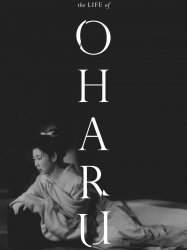
The Life of Oharu (1952)
, 2h28Directed by Kenji Mizoguchi
Origin Japon
Genres Drama
Themes Seafaring films, Films about sexuality, Sports films, Transport films, Erotic films, Films about prostitution, Martial arts films, Erotic thriller films
Actors Kinuyo Tanaka, Ichirō Sugai (菅井一郎), Toshiro Mifune, Takashi Shimura, Chieko Higashiyama, Jūkichi Uno
Rating80%





The story opens on Oharu as an old woman in a temple flashing back through the events of her life. It begins with her love affair with a page, Katsunosuke (Toshirō Mifune), the result of which (due to their class difference) is his execution and her family's banishment. Oharu attempts suicide but fails and is sold to be the mistress of Lord Matsudaira with the hope she will bear him a son. She does, but then is sent home with minimal compensation to the dismay of her father, who has worked up quite a debt in the meantime. He sends her to be a courtesan, but there, too, she fails and is again sent home. She goes to serve the family of a woman who must hide the fact that she is bald from her husband. The woman becomes jealous of Oharu and makes her chop off her hair, but Oharu retaliates, revealing the woman's secret. She again must leave—this time she marries a fan maker who is killed shortly after during a robbery. She attempts to become a nun, but Oharu is thrown out after being caught naked with a man seeking reimbursement for an unauthorized gift (it is made clear this is rape by Oharu's claims and distraught demeanor). She is thrown out of the temple, becomes a prostitute, but fails even at that. In the end, she is recalled to the Lord's house in order to keep secret her activities and to be exiled within the compounds to keep her secrets locked away. While being scolded for the life she chose, she attempts to find her son, and in the process, ends up running away as she chooses the life of a beggar over the life in exile.
 , 1h36
, 1h36Directed by Kenji Mizoguchi
Origin Japon
Genres Drama
Themes Théâtre, Films based on plays
Actors Kinuyo Tanaka, Sō Yamamura, Eijirō Tōno, Chieko Higashiyama, Teruko Kishi, Eitarō Ozawa
Rating67%





Dans une école d'art dramatique, au début du XX siècle, le metteur en scène Shimamura a pour objectif d'élargir son répertoire au théâtre étranger contemporain et de ne plus se cantonner aux seules représentations kabuki. À cette fin, il est autorisé à monter Maison de poupée d'Henrik Ibsen. Mais il recherche une actrice locale digne d'interpréter le rôle principal de Nora. La rencontre avec la comédienne Sumako Matsui est décisive. Celle-ci, deux fois malheureuse en amour et proche d'un état suicidaire, veut s'émanciper pleinement, à la fois comme femme et comme actrice. La pièce d'Ibsen entre donc en résonance avec sa vie et son idéal. De son côté, Shimamura, en homme de son temps, estime, par exemple, que sa fille doit choisir par elle-même l'amour et l'homme qui lui conviennent. Il refuse d'émettre le moindre avis à ce sujet, ni même de rencontrer l'éventuel mari. Sur le plan strictement professionnel, Sumako et Shimamura sont, tous deux, des perfectionnistes. L'osmose est donc totale : elle aboutira à une vie de couple et à la fondation d'un Théâtre d'Art moderne.
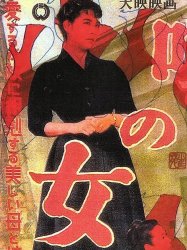
The Woman in the Rumor (1954)
, 1h24Directed by Kenji Mizoguchi
Origin Japon
Genres Drama, Romance
Themes Films about sexuality, Erotic films, Films about prostitution, Erotic thriller films
Actors Kinuyo Tanaka, Yoshiko Kuga, Eitarō Shindō, Haruo Tanaka, Chieko Naniwa, Saburo Date
Rating73%





Hatsuko dirige une maison de geisha à Kyoto, elle est veuve. Sa fille Yukiko revient de Tokyo après une tentative de suicide, quand son amant l'a abandonné. Hatsuko est la maîtresse du jeune docteur Matoba, qui s'occupe des geishas de la maison. Le médecin est attiré par Yukiko, qui d'abord le méprise, comme tout ce qui concerne la maison des courtisanes de haut-rang (太夫, tayū) et geisha. Mais Yukiko change d'attitude ; sans le savoir, les deux femmes aiment le même homme.

Street of Shame (1956)
, 1h27Directed by Yasuzō Masumura, Kenji Mizoguchi
Origin Japon
Genres Drama
Themes Films about sexuality, Erotic films, Films about prostitution, Erotic thriller films
Actors Machiko Kyō, Ayako Wakao, Aiko Mimasu, Kenji Sahara, Michiyo Kogure, Kumeko Urabe
Rating77%





Five female sex workers are employed at Dreamland, a licensed brothel near the Sensōji(浅草寺)Temple in Tokyo's Yoshiwara district. As the Diet considers a ban on prostitution, the women's daily dramas play out. Each has dreams and motivations. Hanae is married, her husband unemployed; they have a young child. Yumeko, a widow, uses her earnings to raise and support her son, who's now old enough to work and care for her. The aging Yorie has a man who wants to marry her. Yasumi saves money diligently to pay her debt and get out; she also has a suitor who wants to marry her, but she has other plans for him. Mickey seems the most devil-may-care, until her father comes from Kobe to bring her news of her family and ask her to come home.

Princess Yang Kwei Fei (1955)
, 1h38Directed by Kenji Mizoguchi
Origin Japon
Genres Drama, Historical, Romance
Actors Machiko Kyō, Masayuki Mori, Sō Yamamura, Sachiko Murase, Eitarō Ozawa, Isao Yamagata
Rating70%





Dans la Chine du VIII siècle, l'impératrice Yang choisit de se sacrifier pour sauver l'empereur.
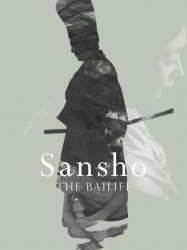
Sansho the Bailiff (1954)
, 2h4Directed by Kenji Mizoguchi
Origin Japon
Genres Drama
Themes Seafaring films, Sports films, Transport films, Martial arts films
Actors Kinuyo Tanaka, Kyōko Kagawa, Eitarō Shindō, Ichirō Sugai (菅井一郎), Ken Mitsuda, Masahiko Tsugawa (津川 雅彦)
Rating83%





Sansho the Bailiff is a jidai-geki, or historical film, set in the Heian period of feudal Japan. A virtuous governor is banished by a feudal lord to a far-off province. His wife and children are sent to live with her brother. Several years later, the wife, Tamaki (Kinuyo Tanaka), and children, Zushiō and Anju, journey to his exiled land, but are tricked on the journey by a treacherous priestess. The mother is sold into prostitution in Sado and the children are sold by slave traders to a manorial estate in which slaves are brutalized, working under horrific conditions and branded when they try to escape. The estate, protected under the Minister of the Right, is administered by the eponymous Sanshō (Eitarō Shindō), a bailiff (or steward). Sanshō's son Tarō (Akitake Kōno), the second-in-charge, is a much more humane master, and he convinces the two they must survive in the manor before they can escape to find their father.
 Connection
Connection
